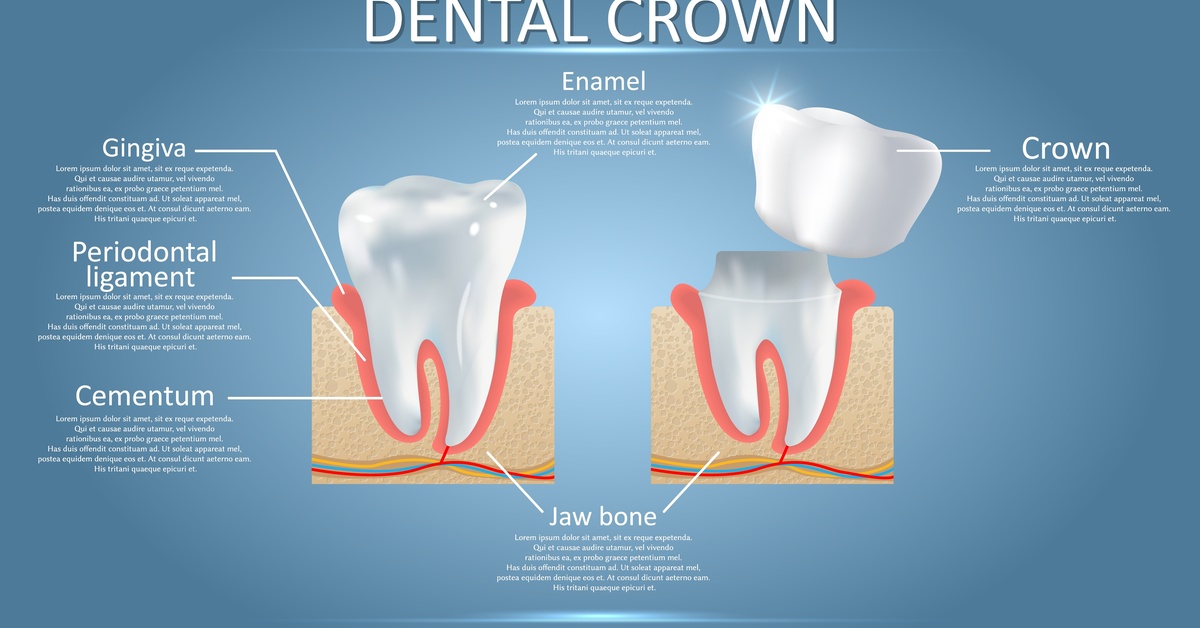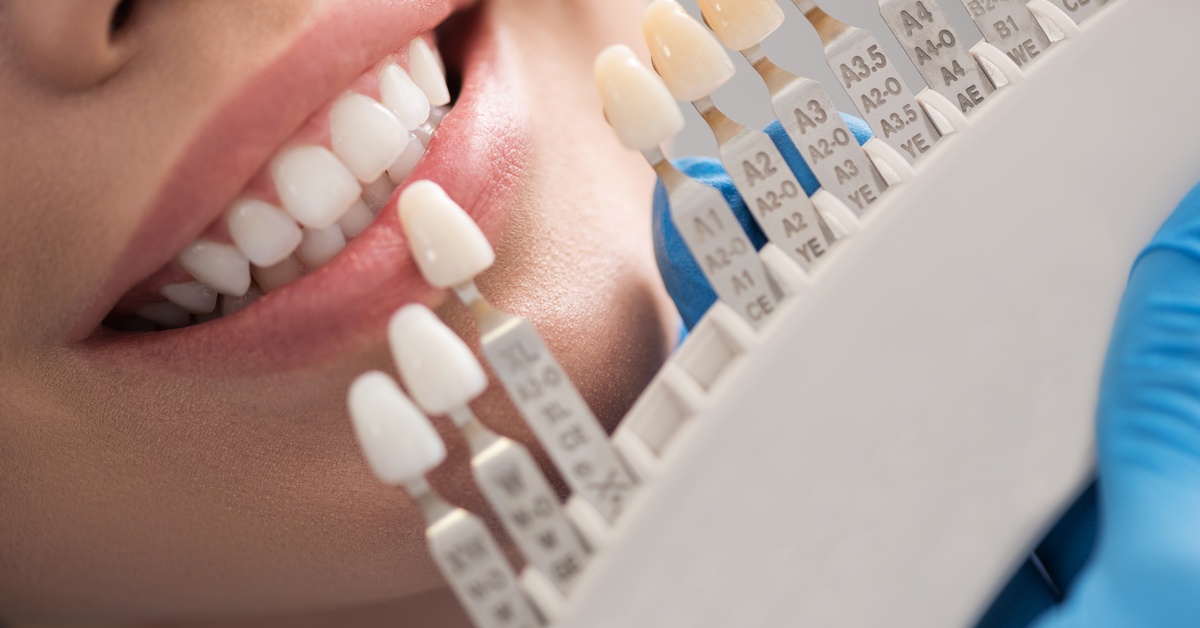
Your smile faces daily challenges that can weaken and damage your teeth over time. Dental crowns offer a proven solution that restores both function and appearance to your teeth. A lesser-known benefit is that dental crowns can protect your teeth as well. Understanding how these custom-fitted caps work and how they’ll continue to protect your teeth can help you make informed decisions and preserve your natural teeth for years to come.
Dental Crown Basics
Dental crowns serve as protective caps that completely cover damaged or weakened teeth, providing a durable layer of protection. These restorations encircle the entire visible portion of a tooth above the gum line, creating a barrier against further damage.
Crowns restore teeth to their original shape, size, and strength while improving their appearance. The crown process involves reshaping the existing tooth to accommodate the restoration. Your dentist removes a small amount of tooth structure to create space for the crown material.
This preparation secures the proper fit of the crown, so it keeps your normal bite function. The crown then bonds permanently to the prepared tooth, becoming an integral part of your dental structure.

Materials Make a Difference
The materials used in crowns offer varying levels of protection and aesthetics. Porcelain crowns and ceramic crowns have excellent color matching abilities, making them a popular choice for a natural appearance, especially for front teeth. These crowns resist staining and offer good resilience for normal chewing forces.
Metal crowns, including those made of gold and other alloys, offer superior strength and longevity. These materials withstand heavy chewing forces exceptionally well, making them ideal for back teeth where strength matters more than appearance. Metal crowns require less tooth removal during preparation, preserving more of your natural tooth structure.
Porcelain-fused-to-metal crowns combine the strength of metal with the aesthetics of porcelain. The metal core provides structural support while the porcelain outer layer delivers a natural appearance. This combination works for both front and back teeth, providing balanced performance in terms of both strength and aesthetics.
Protecting Against Decay and Damage
Crowns create an impenetrable barrier against bacteria and acids that cause tooth decay, which is how dental crowns can protect your teeth. The crown material covers all exposed tooth surfaces, stopping bad bacteria from reaching the underlying tooth structure. This protection proves especially valuable for teeth with large fillings or a history of previous decay.
The perfect bond between crown and tooth eliminates gaps where bacteria might accumulate. Properly fitted crowns redirect biting forces evenly across the tooth surface, hindering any stress on the area that could lead to fractures. This even distribution of forces helps protect both the crowned tooth and the surrounding teeth from excessive wear and tear.
Crowns also protect teeth from temperature extremes and acidic foods that can cause sensitivity and enamel erosion. The crown material acts as insulation and a barrier to sensitivity, allowing drinking and chewing to remain comfortable.
Strengthening Weakened Tooth Structure
Teeth weakened by large fillings, root canal treatment, or trauma benefit significantly from crown protection. These compromised teeth face an increased risk of fracture under normal chewing forces. Crowns restore the structural integrity of a weakened tooth by surrounding it with strong, durable material.
The crown transfers chewing forces to the tooth root through the prepared tooth structure, distributing stress more evenly than weakened natural tooth material alone. This force distribution prevents stress concentrations that could cause the tooth to crack or break during normal function.
Root canal-treated teeth benefit from crown protection, especially. The removal of tooth structure to access the nerve makes the tooth more fragile. Crowns provide important structural support, allowing root canal-treated teeth to function normally for decades.
Restoring Proper Bite Function
Damaged teeth can disrupt normal bite patterns, leading to jaw discomfort and uneven wear on other teeth. Crowns restore proper tooth height and contours, reestablishing balanced bite relationships. This restoration prevents excessive forces from hurting other teeth, reducing jaw strain.
The crown design incorporates proper alignment and shaping with adjacent teeth, keeping healthy spacing and preventing food impaction. These contact relationships can support gum health..
Crown restoration enables normal speech patterns by maintaining proper tongue positioning and ensuring optimal airflow. Damaged front teeth can affect speech clarity, and crowns restore the precise tooth contours needed for clear pronunciation.

Long-Term Health Benefits
Crowns contribute to overall oral health by upholding proper tooth alignment and preventing shifting. When damaged teeth cannot function properly, adjacent teeth may move into the space, creating bite problems and making it difficult to clean. Crowns secure the proper tooth positioning and spacing.
The smooth surface of a crown makes it resistant to plaque accumulation, better than rough or damaged natural tooth surfaces. This characteristic makes crowned teeth easier to clean and maintain, providing better overall oral hygiene. Regular brushing and flossing is necessary, keeping your crowns functional.
Crowns eliminate the cycle of repeated repairs that often occur with large fillings. Instead of gradually enlarging fillings as decay recurs, crowns provide definitive protection that can last decades with proper care. This stability reduces the need for frequent dental interventions.
Preventing Future Complications
Early crown placement can prevent minor teeth problems from developing into more severe issues that need extensive treatment. Cracked teeth that receive crowns promptly avoid the progression to complete fractures that might require extraction. This preventive approach preserves natural teeth and avoids more complex replacement procedures.
Crowns also prevent the need for root canal treatment in some cases. Teeth with deep decay or large fillings that approach the nerve may develop sensitivity or infection. Crown protection can slow this progression and maintain tooth vitality for longer.
The investment in crown protection often proves more affordable than repeated repairs or eventual tooth replacement. Quality crowns can function effectively for 15-20 years or longer, keeping excellent long-term value in oral health protection.
Maintaining Your Crown Investment
Proper care ensures crowns provide maximum protection throughout their lifespan. Regular dental checkups allow for early detection of any crown problems before they compromise tooth protection. Professional cleanings remove plaque and tartar that could affect crown margins.
Avoiding hard foods and harmful habits, such as ice chewing or teeth grinding, protects both crowns and natural teeth. Night guards can protect crowns from grinding forces during sleep, extending their lifespan and maintaining their protective function.
Good oral hygiene practices, including daily brushing and flossing, help maintain the health of the gum line around crowns. Healthy gums provide better support for crowned teeth and reduce the risk of complications that could compromise the crown’s protection.
Making the Right Choice
Dental crowns provide comprehensive protection, preserving natural teeth while restoring full function and appearance. The investment in crown treatment pays dividends through improved oral health, enhanced comfort, and long-lasting results.
At Pinnacle Dental Associates, we specialize in providing high-quality dental crowns and bridges to help you maintain a healthy, confident smile. Schedule an appointment today for the convenience of same-day crowns. Don’t allow dental decay or damaged teeth to hold you back any longer!
